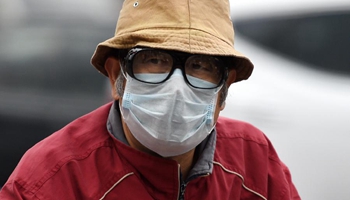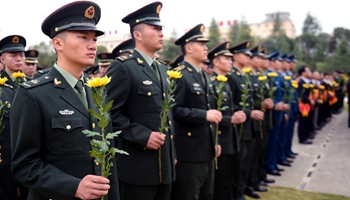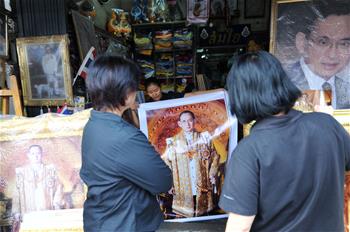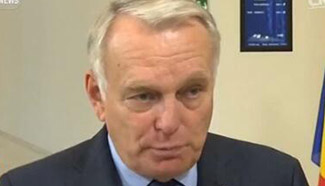BEIJING, Oct. 18 (Xinhua) -- Leading professionals from the international community have spoken highly of China's achievements in the reform of organ donation and transplant, and will offer support to the country's mission in the field.
"WHO will as always support China's mission in organ donation and transplant," said Margaret Chan, World Health Organization (WHO) director general, in a video message delivered at the opening of a workshop on organ donation and transplantation that will last Monday to Wednesday.
She said the direction of China's reforms was correct and its actions quick, adding that many successful experiences in China could serve as a model for other countries facing similar challenges.
The workshop is the first international conference on organ donation and transplantation that the Chinese mainland has hosted and was jointly organized by domestic and overseas organizations, including the China National Organ Donation & Transplant Committee (CNODTC), the International Society for Organ Donation and Procurement (ISODP) and The Transplantation Society (TTS).
Huang Jiefu, director of the CNODTC said that China's transplant professionals were determined to push forward work with the international community in order to contribute more to the health of human beings.
REMARKABLE PROGRESS IN THE PAST DECADE
Consistently adhering to the principle of voluntary organ donation, China has made unremitting efforts in refining its organ transplant system during the past decade.
According to the National Health and Family Planning Commission (NHFPC), the number of organ donations per year in China ranks first in Asia, and third in the world. The number of organ transplants in China is second in the world, after the U.S.
In 2007 the State Council issued regulations on transplants, banning organizations and individuals from trading human organs, a symbol that the country's organ donation and transplant services were moving towards a legal and institutionalized system.
In a later move, China launched a pilot organ donation system in 2010, and amended the criminal law in 2011 to criminalize unauthorized removal of organs and organ trading, under which criminals could face homicide charges.
In 2013, the NHFPC required provinces across China to allocate donor organs through a shared computer system to ensure that organ management and distribution were scientific, highly-efficient and fair.
China banned transplants of organs donated from executed prisoners in January 2015, since when voluntary citizen-based organ donations have been the only source of organs.
In the same year, China published national guidelines on organ donation to raise public awareness and support for the cause.
In May 2016, an organ transport "green passage" was built, aiming to streamline the process of organ transportation under a "people-oriented, life first" governing idea, based on cooperation in multiple sectors, including civil aviation and high speed trains.
In the first nine months of this year, China processed 2,950 organ donations, up 50 percent year on year.
Chinese per million population (PMP) in donation rates have grown substantially since 2010, and are now higher than Japan's and ranks in the top 10 in Asia, the NHFPC said.
"What China has done shows our commitment to social harmony and laws," Huang told Xinhua, adding that the progress reflects the nation's conventional values and helps build confidence in its system.
"With more people being willing to donate their organs, social interdependence in China is strengthened," Huang said.
RIGHT PEOPLE IN THE RIGHT PLACE
"I am deeply impressed that the number of donors has significantly increased in China over the past few years," Marti Manyalich, ISODP president told Xinhua. "China should be proud of the figure."
Manyalich expected the annual number of organ donations in China to reach number one in the world by 2020. "Self-sufficiency of organs, which the country might achieve in the future, would bring a healthier China and be a significant contribution to the world," Manyalich said. "This is an important system with the right people in the right place."
As a globally respected anesthesiologist from the University of Barcelona, Manyalich has strongly pushed forward training programs for hundreds of Chinese professionals in Spain.
He is also pleased to see that an increasing number of Chinese doctors are joining ISODP. Such engagement and exchange "spreads and puts more knowledge into practice."
Jose Nunez, a WHO officer in charge of global organ transplantation, said "the progress shows the whole nation's determination."
"China has excellent professionals," Nunez said, adding that "technologies in China's organ transplantation are the same" as any developed country in the world.
"China clearly demonstrates its will to make a change," said Francis Delmonico, former president of TTS and a professor at Harvard Medical School.
REACTING TO SPECULATION
"Chinese practice is safe, transparent, and ethical," Nunez said. "Those who have been challenging China's organ transplantation for all these years should bring data and evidence."
"Sometimes it is necessary to face challenges, speculation and rumors," Nunez said. "But combining efforts from hundreds of Chinese professionals with the highest ethical standards in their practice, mean that rumors should be quelled."
"China, from what I have observed, fully abides by international standards," said Manyalich, who has traveled to China over 15 times. "I never saw a difference between China and the rest of the world.
"As a WHO officer, I have the privilege of being able to witness all these great changes that are happening in China. I feel deeply pleased and proud to be participating in this success, and to see the building of the next great donation-transplant program in the world," Nunez said.










